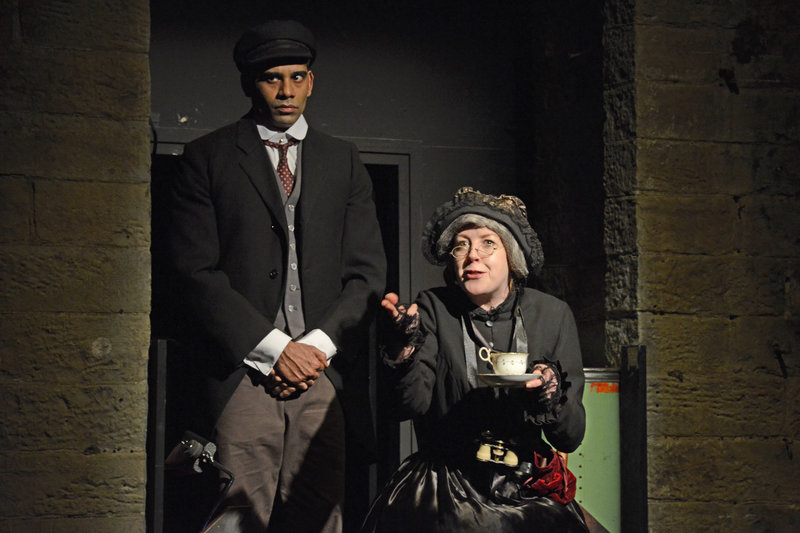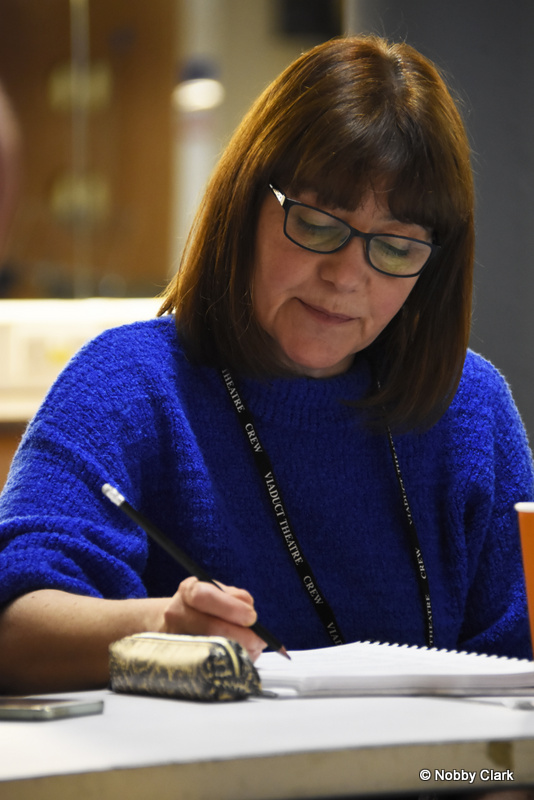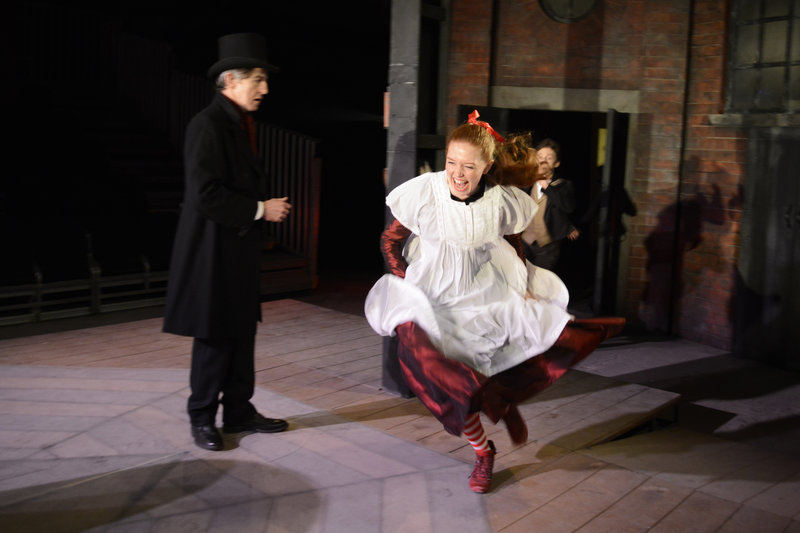”Charles Dickens is in the DNA of the nation really” – Debbie McAndrew
| 5th March 2018

Debbie McAndrew, Credit: The Lowry
Filled with northern wit, an enchanting circus and ideological extremes, Hard Times, written by Charles Dickens, is at The Lowry until Saturday 10 March.
Debbie McAndrew (Coronation Street, Christmas Carol) has adapted the famous novel for the Northen Broadsides company and wants to make sure people don’t think the play will be ‘too grim up north’ despite its setting.
Viva caught up with McAndrew to talk all about the play, what writing is really like and even a little bit of Shakespeare.
Could you give us a summary of the adaptation?
The show is an adaptation of the book Hard Times by Charles Dickens which is his only truly northern book. It’s also his shortest but of course short is a relative term.
It centres around two storylines. One is around the characters of the Gradgrind family. Mr Thomas Gradgrind, who is a wealthy middle-class man, has founded a school which the children are taught a very rigid system of education which precludes all arts; no stories, no poetry and no music. No art of any kind is permitted.
In his own home, he inflicts this attitude to his own children to the extreme that there is no imagination in the house. His two children, of which there is more in the book but only two in our adaptation, Louisa and Tom are irreparably damaged by this form of upbringing. Mr Gradgrind isn’t a bad man, but he is an ideological zealot and therefore is as damaging to as any bad human can be.
Running alongside the Gradgrinds is the story of a cotton weaver called Stephen Blackpool. The way the two stories parallel really is that his life is entirely mechanised, and he’s oppressed and there are no imaginative graces in his life either. He appeals to his boss Mr Bounderby, who runs the mill, owns the bank and who eventually marries Louisa, and the two stories collide in a tragic way.
It sounds like it’s dead miserable but it’s not. It’s actually very funny and within the context of the world in the book, there is a circus called Sleary’s circus, which is a horse riding circus, and one of the clown’s daughters (Sissy) is taken by Mr Gradgrind when her father disappears. But of course, she is beyond help because she’s already a too imaginative and well-rounded human for this world. So, we track Sissy’s story as well.
In this adaptation, to make it theatrical, entertaining and stop it being too grim up north, the circus is part of the story throughout. In the book, we only return to the circus at the end of the story.
Why did you decide to adapt this novel for the stage?
Conrad Nelson (the show’s director) and I have worked together quite a lot, were actually married to each other. We’ve done work for Broadside together, myself as a writer and him as a director, but I’ve never adapted a novel for him to direct.
Hard Times is the northern book and its Dickens, people like Charles Dickens is in the DNA of the nation really, we all feel as if one character or story of Dickens’ is in our imagination whether it’s Kermit as Bob Cratchit or otherwise. Hard Times is a great story and it’s always a tricky thing cramming it into two and a half hours on the stage, but I hope we’ve made a really entertaining evening with music.
How is being an actor, for example in Coronation Street, differ from writing theatre plays?
I was an actor in Corrie, which was so long ago in 1997, but it is what everyone remembers, which is completely fine.
I’ve always written, I even wrote plays as a child. Then I went to university to be a teacher so I’ve always been a bit bookish, but I love acting. I started working as an actor in 1990 and I just never stopped so I didn’t have to take all those risks because writing is hard.
It’s exposing and painful when you get rejected. If you don’t get an acting job yes there is an element of rejection involved, even though I haven’t really experienced that myself as I did work quite consistently, but you haven’t actually invested a huge amount at the point of rejection.
You went for an audition, learnt a few lines, might have spent thirty quid on the train which is annoying but ultimately it’s about half a day’s work at the most. If you put a piece of writing in and it’s rejected you’re talking about months and months of work and a lot of yourself poured into it which makes it a lot riskier being a writer.
The problem with acting is there isn’t much in between Juliet and the nurse. The parts really dry up, especially when you work in the theatre until you get to 60, so you might as well take time off have a baby and whatever. It’s a harsh reality which hopefully for this generation will change.
But I’m fine with that because I love writing so I pursued that and now I don’t have to do any acting. I would only go back to acting if I wanted to because at the moment I have a busy life as a writer and once you are established there less competition even if it is still quite difficult to break into the industry as a woman.
I just love writing and it’s my happy place being in my room making stuff up.

Photo by Nobby Clark
Do you prefer writing over acting or are they the same for you?
For me because I’m a dramatist the two things are very connected in my brain because both are just about imagining what it’s like to be other people and be in their heads. What I love about writing is that I get to be everyone, it’s about the parts I get to play which is why I might slightly prefer it.
I get to play the men and the women in my stories and I get to feel them from the inside. We are all Hamlets. We want to think those thoughts and say those words but we don’t get the opportunity whereas when you’re a writer you get to think all those thoughts and express them through any character whether male, female or exit the binary and do something completely new you know whatever, we still get to inhabit a world where we have ownership of the big thoughts and ideas
But I like acting too, it’s fun and you get to be in the gang then. You get isolated as a writer, which I quite like as I am quite a solitary person but then I quite like being in the gang. It’s nice when you’re in a company with your friends and you get to go out every night and do the show.
We have mentioned Shakespeare and the play is an adaptation of a Charles Dickens novel. Why do you think they are still relevant today?
Well because if you take away the electricity and the Wifi you still have the human condition and the human condition is just the same as it ever was and ever will be.
I did the Christmas Carol and was having a conversation about the unique relevance of the play has today and I just think it’s always been relevant. It isn’t just relevant now because there might have been some golden age after the war when the NHS was created or a golden time for the arts in the late 1990s.
There have always been people who have more than others and want to hold onto it and if you look around the world there’s always been a war somewhere there always been inequality and that’s just how it is.
We will always have to express those inequalities and express how we feel about them in everything; love, life, family, work and nature. All the things that matter to us will always have to be expressed through art because it will never stop. It’s built into the human condition.
So, I always think we will return to them because fundamentally it’s all the same. The ideas and thoughts Hamlet has, we always find in ourselves which is why we always go back to him.
Imagination is a huge theme in this play, do you think we are still imaginative today even with relentless technology?
I think we are. A lot of people ask me how do you write? What’s the mechanism to it? And I always say I simply exploit my natural tendency to speculate.
We all do it. If you see somebody talking on the street with somebody you don’t know, immediately you go ‘I wonder who that is’ and if you see something exchanged between them, a moment, a kiss or something gets passed, you wonder what it is. All I do is go away and make up the rest. And we all have that natural tendency to fill in the gaps and imagine.
The mechanism of reading isn’t reading letter by letter or even word by word. Our brains look at patterns. We do all sorts of complex things all the time and it’s selecting from the world what we need and speculating about the rest and filling in the gaps. That is imagination.
Scientists are no less imaginative then artists. Technology is our imagination! They might not want to roll around on the floor and be a tree or whatever but that doesn’t mean they aren’t imaginative. Similarly, artists are rigorous problem-solving people as well. The art of writing to a certain extent is a problem-solving exercise.

Debbie McAndrew (Credit- Nobby Clark)
Have you kept to the timeframe of the book or have you modernised it at all?
It is in keeping with the books time. The period gives you a lot. It gives you higher stakes as well because things that are different, for example in the play there is an attempted seduction of a married woman which she doesn’t allow but the stakes for that women in the context of that world are much higher then they would be for a young woman now.
Mr Bounderby is 30 years older than Louisa, and he’s had his eye on her for a while. Now I don’t think Charles Dickins thinks Bounderby is a paedophile, but our audience gives a little gasp every night when he asks the child Louisa for a kiss because we are talking about things in a different way.
Walking to places on foot isn’t the same if he can get on a train, or letters are sent which wouldn’t if we had mobile phones. The mechanisms of the story are important too. So, there would be ways to modernise it but I felt that it would be best left in its own time
Lastly, how is seeing it come to life?
It’s always great. It’s like you dreamed it and then it happened. You almost get a little Deja vu with it because often the actors are people I know so when I’m working on a final draft I know who’s going to do it and I do have a vivid headspace, which is down to practice.
I’ve been living in my head all my life so it’s quite vivid and once I’ve got these actors in my mind and I know which space they are going to be in, I can put all those ingredients together in my head and I can sit there on opening night and go yep!
There has been the odd time I’ve gone ‘Oh that’s not how imagined it’ but no most of the time it’s a surreal and wonderful pleasure really.
To buy tickets click here.

Photo by Nobby Clark
